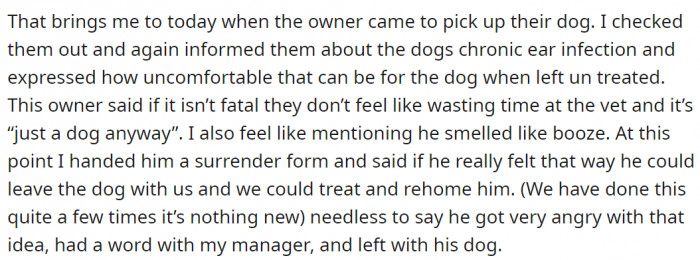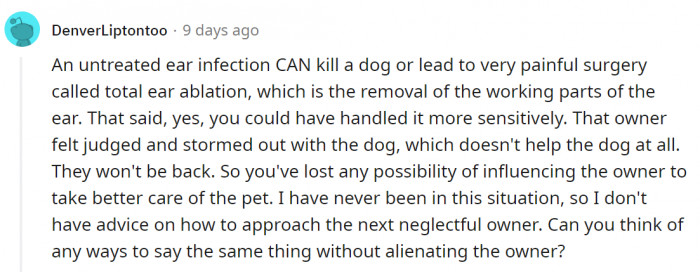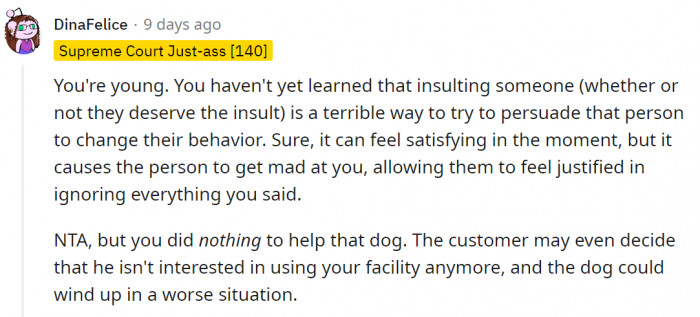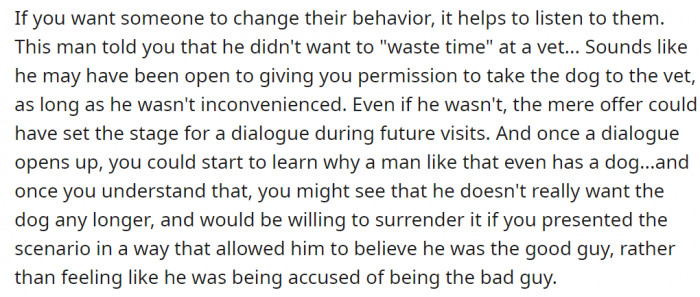Doggie Daycare Attendant Handed This Customer A Surrender Form When He Came To Pick Up His Dog
Dogs are an important part of the family. They provide us with companionship, love, and loyalty. You can't find a better companion than a dog. They are always happy to see you, no matter what kind of day you've had. They are always there for a cuddle or a game of fetch. Dogs truly are man's best friend. That's why it is so important to take care of your pup. These cute critters rely on us for everything, from food and shelter to medication. As Dr. Joel Kahn, a cardiologist and wellness advocate, states, "Our pets depend on us for their health and happiness, and regular veterinary check-ups are essential." It is our responsibility to make sure they are healthy and happy. This becomes even more critical when they are clearly suffering from an illness or injury. One doggie daycare attendant was frustrated by the neglect a customer was showing toward his dog. In a Reddit post, the lady explained that one particular dog regularly came in with an ear infection. However, as a dog boarding facility, all they could do was clean the drainage off the dog and inform the owner. Unfortunately, all their reports fell on deaf ears, as the owner refused to take the pup to a vet. On one occasion, she explained the urgency of the situation and the discomfort that the dog was experiencing. But his response was shocking, to say the least. Well, guess what happened next—the customer was handed a surrender form. The daycare attendant had finally had enough and decided that it was in the dog's best interest to be rehomed. You can bet the owner was absolutely furious. Let's get into the nitty-gritty of the situation, shall we?
Here's a background on the story



Understanding the Request for a Surrender Form
When faced with the decision to issue a surrender form, the daycare attendant may be acting out of a perceived necessity to prioritize the well-being of the dog. Research from the American Psychological Association indicates that professionals in animal care often experience stress when they feel that they cannot meet the needs of the animals in their care, leading to tough decisions that may seem harsh to the pet owner.
This disconnect can stem from differing understandings of pet ownership responsibilities, particularly when the care provided does not align with the expectations of the daycare staff.
Understanding Emotional Responses in Stressful Situations
Dr. Emily Chen, a clinical psychologist at Stanford, notes that emotional outbursts often occur when individuals feel threatened or powerless.
Her research indicates that when a person perceives a loss of control—such as being asked to surrender a beloved pet—they may react with intense frustration or anger.
This reaction is not just a simple overreaction; it's a complex interplay of emotions that stem from attachment and fear of loss.

Let's see how the Reddit community reacted to the story:
"This man obviously has no business owning a dog"
Maybe he should surrender the dog if he's not capable of providing it with adequate medical care.

"I'd anonymously report him for animal cruelty"
A possible case of animal cruelty here.

Additionally, the emotional response from the customer can be understood through the lens of attachment theory. According to Dr. John Bowlby's work on attachment, pets often serve as attachment figures, providing emotional support and companionship. When a pet is threatened with surrender, the owner may experience feelings akin to loss or abandonment, triggering a strong emotional reaction.
These intense feelings can cloud judgment and lead to outbursts, as seen in the customer's response.
Behavioral research shows that attachment theory plays a significant role in how we respond to perceived threats.
When faced with the possibility of losing a pet, individuals may exhibit extreme emotional responses due to the strong bonds formed.
This attachment is often comparable to familial bonds, which can complicate the emotional landscape during conflicts.
"If he drove there, I'd also be making a call to the local cops letting them know to watch for a driver under the influence"
The daycare assistant did mention that the man was drunk. Hopefully, he wasn't driving.

"A drunk guy who repeatedly neglects his pet is unlikely to be receptive to your message"
Now we have an idea of why he got furious.

"An untreated ear infection CAN kill a dog or lead to very painful surgery called total ear ablation...That said, yes, you could have handled it more sensitively"
Maybe she could have handled the situation differently.

The Impact of Stress in Pet Care Settings
Stress in pet care settings can significantly influence decision-making processes. Stress can lead to increased emotional responses and a narrowed focus on immediate problems. When the daycare attendant felt compelled to issue a surrender form, it likely stemmed from a combination of stress, concern for the dog's welfare, and a perceived lack of cooperation from the owner.
Research indicates that high-stress environments can lead to hasty decisions that may not consider all possible solutions, further complicating the situation.
The Role of Communication in Managing Pet-Related Conflicts
Effective communication is crucial in pet care situations to prevent misunderstandings and emotional reactions.
Studies suggest that using clear, non-confrontational language can help mitigate stress and avoid escalation in tense situations.
Practicing active listening and validating each other's feelings can create a more constructive dialogue.
"Maybe call the animal police? Could be illegal where you’re at"
Get the animal police on the phone ASAP!

"NTA, but you did nothing to help that dog. The customer may even decide that he isn't interested in using your facility anymore, and the dog could wind up in a worse situation"

Great advice, but what are your chances with a drunk person?

To address such issues, fostering a culture of open communication and understanding in pet care settings is essential. Establishing clear guidelines and expectations for pet owners can help mitigate misunderstandings. A study from the University of California emphasizes that clear communication can significantly improve outcomes in service environments, enhancing relationships between clients and providers.
Encouraging feedback from customers can also create opportunities for improvement and a better understanding of the needs of both pets and their owners.
Research in social psychology highlights the importance of emotional regulation in managing stress during conflicts.
Learning techniques such as deep breathing or mindfulness can help individuals stay calm and respond more thoughtfully when faced with high-stress situations.
These techniques can reduce the likelihood of explosive reactions and promote healthier resolutions.
It's heartbreaking when dog owners neglect their responsibilities to their furry friends. But, as this doggie daycare attendant found out, sometimes you have to put your foot down to do what's best.
Maybe she could have approached the situation differently, as her manager suggested. But regardless, she's sent a strong message to all dog owners out there.
Your pet deserves the best care possible. So please, make their health and happiness your priority. They depend on us for everything and deserve nothing less in return.
We hope this pup is finally getting proper medical care for his ear. It must have been tough dealing with such discomfort for so long.
Do you think the doggie daycare attendant could have handled things better? Let us know in the comments below!
Practical Solutions for Pet Ownership Disputes
To address conflicts arising from pet ownership, establishing clear guidelines for pet care and responsibilities is essential.
Creating a pet care agreement can help clarify expectations and responsibilities for all involved parties.
Additionally, having regular family meetings to discuss pet-related issues can foster better communication and understanding over time.
Psychological Analysis
This scenario reflects a common reaction when individuals feel their emotional bonds are threatened, particularly regarding pets.
Understanding these emotional dynamics can help in developing strategies to address the underlying fears and facilitate more constructive conversations.
Analysis generated by AI
Analysis & Alternative Approaches
In conclusion, navigating the emotional complexities of pet ownership requires awareness, communication, and empathy.
By employing practical strategies and understanding the psychological underpinnings of emotional responses, individuals can improve their interactions and resolve conflicts more effectively.
As noted by relationship specialists, fostering an environment of open communication can lead to healthier relationships among pet owners.
Analysis & Alternative Approaches
Understanding the psychological factors at play in this situation can help both owners and care providers navigate conflicts more effectively. Research supports the idea that clear communication and empathy are crucial in establishing healthy relationships in pet care settings.
By fostering understanding and collaboration, both parties can work toward solutions that prioritize the well-being of the pet while addressing the concerns of the owner.



